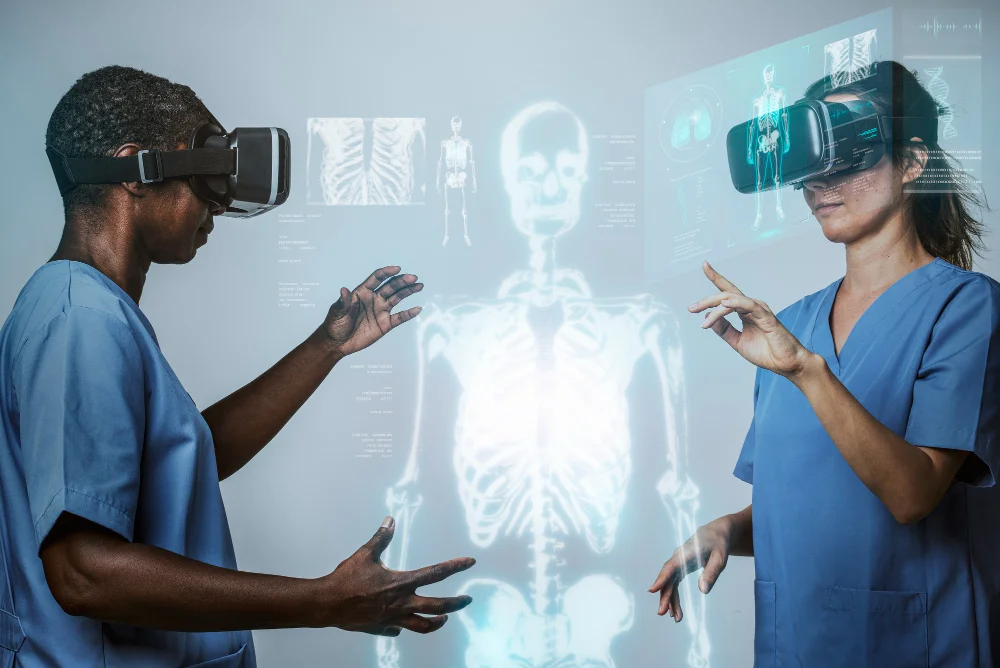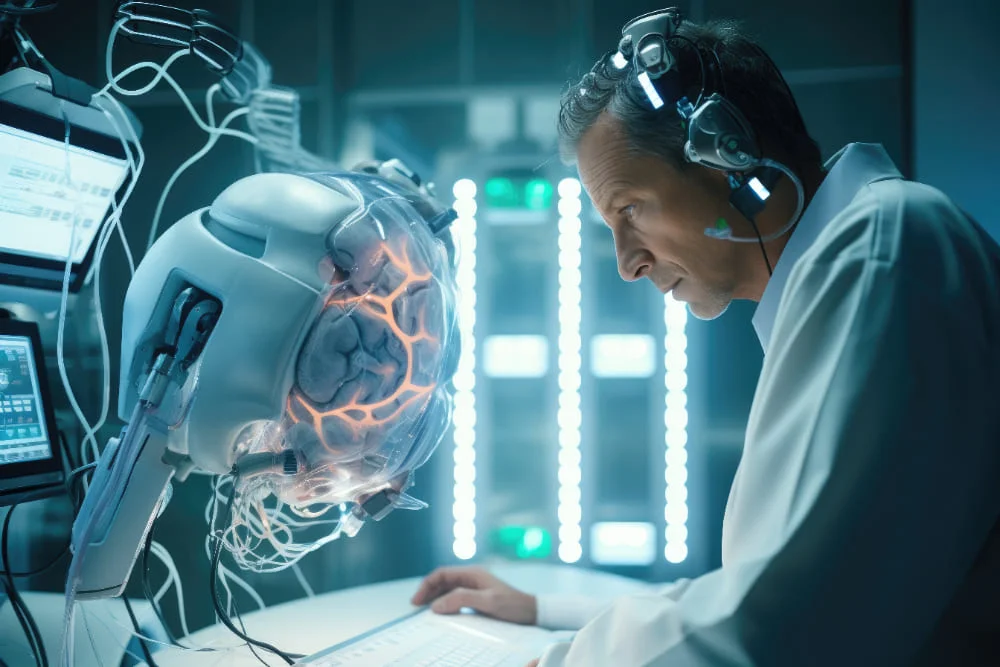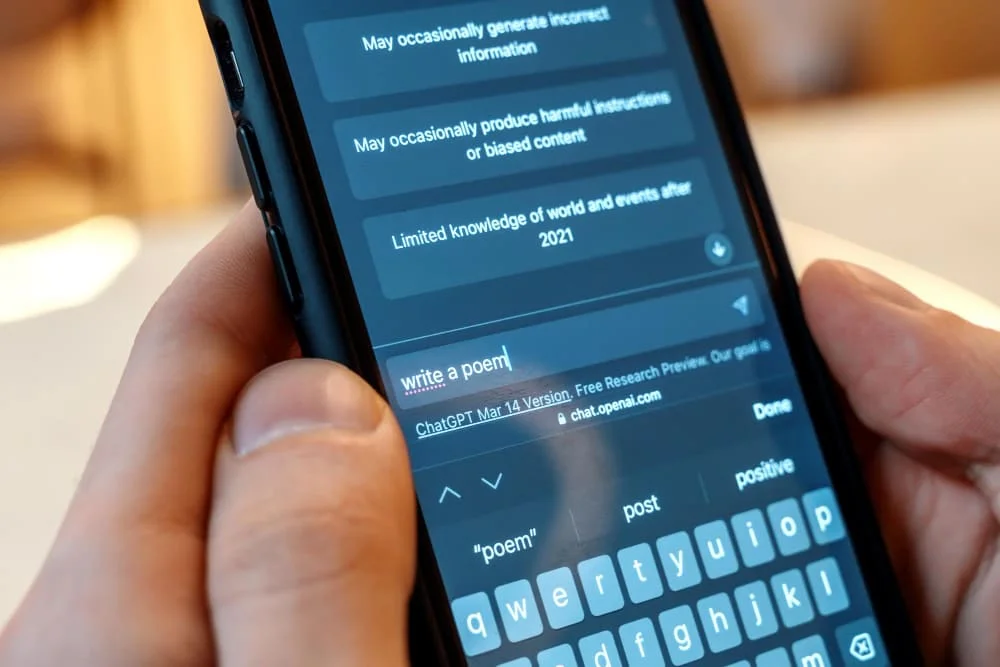The healthcare industry is undergoing a rapid transformation, with Artificial Intelligence (AI) and Machine Learning (ML) playing pivotal roles in redefining patient care, operational efficiency, and medical research. These advanced technologies empower healthcare industry by enabling quicker, more accurate diagnoses, personalizing patient treatments, and enhancing the accessibility of healthcare services.
The integration of AI and ML into healthcare industry isn’t just about new technology—it’s about addressing critical needs such as early disease detection, optimizing treatment plans, reducing healthcare costs, and improving patient outcomes. By analyzing vast amounts of data and learning from it, AI and ML are poised to provide healthcare with insights previously thought impossible. From predictive analytics and medical imaging to robotics in surgery and virtual healthcare assistants, AI and ML applications are diverse and continue to expand.
AI and Machine Learning (ML) are revolutionizing healthcare industry with significant transformations in diagnostics, patient care, administrative workflows, and predictive analytics. Surveys indicate strong adoption and positive impacts of AI in healthcare. For instance, a recent survey by MIT Technology Review Insights found that over 80% of healthcare professionals are already using AI to improve diagnosis accuracy, predict treatment outcomes, and streamline administrative tasks like patient record management.
These advancements have reshaped both clinical and operational processes, reducing the burden on healthcare providers while enhancing the quality of care. In this article, we’ll explore various aspects of how AI and ML are reshaping the future of healthcare industry, delving into areas such as personalized medicine, predictive analytics, drug discovery, administrative automation, and patient management.
Predictive Analytics in Healthcare Industry
Predictive analytics uses AI and ML to analyze historical and real-time data to predict outcomes, such as identifying patients at risk for chronic diseases or predicting hospital admission rates. By employing predictive analytics, healthcare providers can make data-driven decisions, proactively manage patient care, and improve health outcomes. Predictive analytics helps identify potential health issues before they arise, allowing early intervention and reducing hospital readmissions.
For example, AI algorithms can analyze data from wearables, electronic health records (EHR), and genetic information to identify patterns associated with specific health conditions. With the help of AI services, Healthcare professionals can target at-risk individuals with tailored preventive care, thus saving costs and reducing the progression of chronic diseases. By leveraging vast datasets from electronic health records (EHR), wearable devices, and even genetic data, predictive models can reveal patterns that may predict disease onset or patient deterioration. Predictive analytics is transforming healthcare industry in several significant ways:
1.1 Disease Risk Prediction
AI-based predictive analytics can forecast risks for diseases such as diabetes, cardiovascular conditions, and chronic obstructive pulmonary disease (COPD). For instance, algorithms can analyze a combination of lifestyle data, genetic predispositions, and historical health records to assess the likelihood of a patient developing these diseases. With early detection, patients can take preventive measures or undergo early treatment, significantly improving health outcomes and reducing healthcare costs.
1.2 Hospital Readmissions and Resource Allocation
AI helps hospitals anticipate readmissions and manage resources more effectively. For example, by analyzing patient records and patterns, predictive analytics can estimate which patients are at risk of being readmitted within 30 days of discharge. Hospitals can then take preventive steps, such as arranging follow-up care, to reduce these readmissions. Moreover, resource allocation becomes more efficient as predictive models provide insights into patient inflow and treatment needs, allowing hospitals to manage staff and equipment better.
1.3 Personalized Patient Interventions
Predictive models enable healthcare providers to personalize care interventions based on individual patient data. For example, ML algorithms can analyze patient health data to recommend specific lifestyle changes or medical treatments that are likely to be effective. These personalized recommendations make healthcare more targeted and effective, leading to better patient outcomes and reduced healthcare costs.
AI-Powered Diagnostics and Medical Imaging
AI has become a game-changer in medical imaging, where it aids radiologists by accurately analyzing X-rays, MRIs, and CT scans, often detecting subtle abnormalities missed by the human eye. AI systems trained on large datasets can identify diseases like cancer, cardiovascular issues, and neurological disorders faster and more accurately, reducing diagnostic errors.
AI’s role in diagnostics extends beyond imaging to areas such as pathology, dermatology, and even genomics. By enabling faster and more accurate diagnoses, AI shortens the time between symptom detection and treatment, improving patient outcomes and making healthcare delivery more efficient. Traditionally, imaging analysis relies on radiologists or pathologists to interpret data, but with AI, this process is not only expedited but also enhanced by identifying subtle features within images.
2.1 Enhancing Radiology with AI
Radiology departments are adopting AI to support faster and more accurate diagnoses. AI algorithms trained on vast datasets can identify abnormalities in X-rays, CT scans, and MRIs. For example, AI can detect signs of diseases such as lung cancer or pneumonia more accurately than human radiologists in some cases, as it can recognize tiny anomalies that might be overlooked by the human eye. With AI assisting in radiology, diagnosis times are significantly reduced, allowing for timely treatment.
2.2 Pathology and AI
In pathology, AI aids in analyzing tissue samples, looking for markers of diseases such as cancer. Machine learning models trained on large numbers of images can help pathologists identify patterns linked to specific diagnoses. AI-driven diagnostics reduce the time taken to review slides and increase diagnostic accuracy, especially in high-stakes areas like cancer diagnostics, where early detection is critical for effective treatment.
2.3 Early Detection of Retinopathy and Cardiovascular Diseases
AI algorithms are also transforming ophthalmology and cardiology by assisting in the early detection of conditions such as diabetic retinopathy and cardiovascular diseases. For example, ML models can analyze images of the retina to detect retinopathy or assess echocardiograms to predict the risk of cardiac events. These advancements make diagnosis more accessible and affordable, particularly for underserved regions where access to specialists is limited.
Personalized Medicine and Treatment Recommendations
AI and ML are driving the shift toward personalized medicine, tailoring treatments to individual patients based on their unique genetic makeup, lifestyle, and environment. Machine learning algorithms can analyze genetic data alongside health records, lifestyle factors, and even socio-economic backgrounds to provide personalized treatment recommendations.
The EIT Health and McKinsey report highlights that AI could help close the workforce gap in healthcare, predicting an increase in productivity by allowing medical staff to dedicate more time to patient care. The World Health Organization estimates a global shortfall of 9.9 million healthcare workers by 2030, which AI-powered automation and efficiency gains could help mitigate by easing the burden on healthcare practitioners
This personalized approach is particularly beneficial in areas like oncology, where AI can help identify which treatment protocols are most likely to succeed based on the patient’s specific genetic profile. In addition, AI-powered systems can adapt over time, continually refining treatment recommendations based on new research and data inputs, ensuring the best possible patient outcomes.

By applying AI and ML to this data, healthcare providers can create personalized treatment recommendations that are more likely to yield positive outcomes. As a top healthcare software development company, our AI and ML approach is especially beneficial in areas like oncology, where treatments can be personalized based on the genetic mutations driving a patient’s cancer.
3.1 Genomic Data and AI
Genomics plays a crucial role in personalized medicine. AI-powered tools analyze genomic data to identify genetic variations that may indicate susceptibility to certain diseases. In oncology, for example, AI can analyze a tumor’s genetic profile and recommend targeted therapies, improving the chances of a successful treatment outcome. AI also helps researchers identify genetic markers associated with particular diseases, paving the way for more precise treatment.
3.2 Lifestyle Data Integration
Machine learning algorithms can incorporate lifestyle data, such as diet, physical activity, and environmental factors, into treatment recommendations. By evaluating this data, AI can recommend lifestyle changes or preventive care measures tailored to the patient’s specific needs. For instance, a patient at risk of heart disease might receive personalized diet and exercise plans based on AI analysis.
3.3 Adapting Treatment Plans Over Time
AI can continuously adapt treatment recommendations based on new data, ensuring that patients receive the most effective care. For example, if a patient does not respond to a particular medication, ML algorithms can analyze the patient’s response data and recommend alternative treatments. This dynamic approach enables more effective, patient-centric care and minimizes the trial-and-error associated with traditional treatment methods.
Administrative Automation in Healthcare Industry
AI also significantly impacts administrative tasks, helping streamline operations, reduce paperwork, and minimize human error. Through intelligent automation, AI can manage tasks such as patient scheduling, billing, and claims processing, thus freeing up healthcare professionals to focus more on patient care. Machine learning algorithms can predict patient flow in hospitals, optimize staff scheduling, and ensure the availability of resources.
This application of AI helps healthcare institutions become more efficient, lowers costs, and enhances the patient experience by reducing waiting times and improving overall service quality. Healthcare providers face a significant administrative burden, from billing to patient scheduling and documentation. AI and automation help streamline these tasks, allowing healthcare workers to focus on patient care rather than administrative work. This efficiency is achieved by implementing ML algorithms and robotic process automation (RPA) for routine administrative tasks. Here is how AI-driven Administrative Automation is optimizing healthcare industry:
4.1 Automating Billing and Claims Processing
Billing and claims processing are time-consuming and error-prone. AI algorithms can process claims, verify codes, and ensure compliance with insurance standards, reducing errors and speeding up the reimbursement process. Automation in billing improves financial accuracy, lowers administrative costs, and enhances the patient experience by reducing billing errors and delays.
4.2 Patient Scheduling and Resource Allocation
AI-powered scheduling systems predict patient flow, allowing healthcare providers to manage staff more effectively. By analyzing historical data, ML algorithms optimize schedules to minimize wait times and prevent overbooking. These solutions also enable resource allocation, ensuring that healthcare facilities have the necessary supplies and staff on hand to handle anticipated patient volumes.
4.3 Document Management and Compliance
Document management is another area where AI aids in reducing administrative workload. AI algorithms organize and retrieve patient records efficiently, allowing healthcare providers to access necessary information quickly. Additionally, AI tools help with regulatory compliance by ensuring documentation is complete and accurate, reducing the risk of penalties or audits.
Drug Discovery and Research
AI accelerates the drug discovery process by rapidly analyzing vast datasets, from genetic data to the results of previous drug trials. By identifying potential drug compounds, AI reduces the time and cost associated with bringing new medications to market. ML models can simulate thousands of scenarios, predicting how different drugs react to certain conditions and identifying possible side effects before clinical trials. This capability is revolutionizing pharmaceutical research, allowing for the development of more effective drugs with fewer side effects.
Drug discovery is a lengthy and costly process that traditionally takes years to yield viable treatments. AI accelerates this process by predicting how new compounds interact with biological targets, identifying potential side effects, and simulating clinical outcomes. Machine learning enables researchers to analyze large datasets and reduce the time required to bring new drugs to market. Let’s explore how drug discovery can transform the healthcare industry :
5.1 Compound Screening and Identification
AI algorithms can screen billions of compounds and identify those with the potential to treat specific diseases. By analyzing biological and chemical properties, AI models predict a compound’s effectiveness and possible side effects, allowing researchers to focus on the most promising candidates.
5.2 Predicting Drug Interactions and Side Effects
AI also assesses potential drug interactions, which is essential for patient safety. Machine learning models analyze data from clinical trials and patient records to predict possible adverse reactions between different medications, ensuring safer drug prescriptions.
5.3 Clinical Trial Optimization
AI optimizes clinical trials by identifying suitable patient groups, predicting trial outcomes, and even suggesting modifications to improve trial efficiency. By analyzing historical data, AI can improve participant selection, increasing the likelihood of successful trials and shortening time to approval.
How Cenozic Can Help Healthcare Industry
Cenozic is at the forefront of healthcare technology development, combining expertise in Artificial Intelligence (AI), machine learning (ML), data analytics, and software engineering to provide solutions that transform patient care and operational efficiency in the healthcare industry. Here’s how Cenozic can help healthcare organizations meet their technology needs:
1. AI-Powered Predictive Analytics and Patient Management
Cenozic, as a leading software development services provider, uses AI and ML to create predictive analytics models that enhance proactive patient care. These models analyze vast data sets from electronic health records (EHRs), wearable devices, and genetic information to forecast patient health trends, predict disease risks, and improve patient management. By integrating predictive insights, healthcare providers can take preventive actions and personalize care, which helps in improving patient outcomes and reducing healthcare costs.
2. Enhanced Medical Imaging and Diagnostics
With expertise in deep learning and computer vision, Cenozic provides solutions for AI-powered medical imaging and diagnostics. Our solutions assist radiologists and pathologists in analyzing medical images more accurately and rapidly, aiding in the detection of diseases like cancer, cardiovascular conditions, and other abnormalities. By using advanced algorithms, Cenozic ensures that healthcare providers can make faster, more reliable diagnoses, improving the quality and timeliness of patient care.
3. Personalized Medicine Development
Cenozic’s AI-driven solutions enable the creation of personalized treatment plans based on individual patient data, including genomics and lifestyle information. Our solutions analyze these complex data points to identify targeted therapies, especially in fields like oncology, where treatments can be customized to a patient’s genetic profile. This approach improves treatment outcomes, reduces side effects, and supports a more patient-centered healthcare experience.
4. Secure, Compliant Healthcare Solutions
Cenozic is committed to developing secure, HIPAA-compliant healthcare software solutions. We build platforms with robust security protocols to protect patient data and maintain compliance with healthcare regulations. Our data encryption, user authentication, and secure cloud infrastructure ensure that healthcare organizations can operate with confidence, safeguarding sensitive information in line with regulatory standards.
Conclusion
Artificial Intelligence and Machine Learning are driving a revolutionary transformation in healthcare industry, reshaping how patient care is delivered and how healthcare systems operate. By enhancing diagnostic accuracy, personalizing treatment, and facilitating real-time patient monitoring, AI and ML empower healthcare providers to make data-driven, timely, and more accurate decisions. These technologies not only improve patient outcomes but also significantly reduce costs and optimize the use of healthcare resources.
AI and ML applications are helping address some of the industry’s most pressing challenges, such as the shortage of healthcare professionals, the need for continuous patient care, and the management of vast amounts of data. Through predictive analytics, automation of routine administrative tasks, and sophisticated medical imaging techniques, AI is paving the way for a more efficient, patient-centered approach to healthcare.
For organizations aiming to integrate AI and ML into their healthcare services, partnering with technology experts like Cenozic can streamline the journey. Cenozic’s expertise in healthcare development—ranging from predictive analytics to secure, HIPAA-compliant software solutions—supports healthcare providers in harnessing the full potential of AI and ML. With tailored solutions that prioritize patient care, data security, and regulatory compliance, Cenozic stands ready to help healthcare organizations transform their services for a better, AI-driven future.


 The Future of AI: How Machine Learning is Transforming Businesses
The Future of AI: How Machine Learning is Transforming Businesses  AI in E-commerce: Enhancing Customer Experience & Engagement
AI in E-commerce: Enhancing Customer Experience & Engagement  How AI-Powered Chatbots Are Revolutionizing Customer Support
How AI-Powered Chatbots Are Revolutionizing Customer Support  The Role of AI in Mobile App Development: Smarter and Faster Apps
The Role of AI in Mobile App Development: Smarter and Faster Apps  How To Choose Top Website Development Company In USA
How To Choose Top Website Development Company In USA 